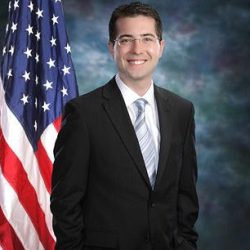Michigan iGaming Bills Awaiting Consideration

Michigan is looking more hopeful of becoming the fifth state in the US to legalize online gambling, with a number of bills awaiting consideration during the 2018 legislative session. Two of the bills, namely House Bill 4926 and House Bill 4927, were introduced by Michigan State Rep. Brandt Iden (photo) and a number of supporters a couple of months ago, while a third piece of legislation, House Bill 4928, was sponsored by Representative Klint Klesko, and lays out the legal repercussions for those gamblers violating the new online laws should the two other two bills pass.
Cause for Optimism
Following a positive 12-3 vote last week by the Michigan House Regulatory Reform Committee, the three online-gaming bills have now moved to the House, with Rich Muny, Vice President of the Poker Players Alliance (PPA), expressing his hope that next year may be the one when Michigan finally embraces an online poker and gambling industry. As Muny subsequently stated:
“H. 4926 still faces many hurdles. This committee vote should help greatly in the process of bringing together many of the stakeholders, but there remains work to be done. Please be sure to do your part to help make online poker a reality in the Wolverine State.”
iGambling Bills
The bulk of the online gambling legislation is contained within HB 4926, which establishes the Lawful Internet Gaming Act, allowing for internet gaming and the licensing of various activities, as well as the creation of the Division of Internet Gaming within the Michigan Gaming Control Board, taxes on licensed internet gaming, an Internet Gaming Fund, and the prohibition and levying of criminal penalties for those violating the act.
Meanwhile, companion bill HB 4927 establishes that gambling activities in accordance with HB4926 do not violate earlier laws.
Together, the bills works much the same as bills introduced in other states, although licensing fees are set lower, with an online license set at $200,000, and annual renewal fees at $100,000. Furthermore, software platform providers are able to join in at half the price for their initial application, and $50,000 per annum thereafter.
Tribal Objections
The big question concerning the online bill is whether tribal gaming interests in the state lend their support to the gambling expansion, making Michigan a similar test case to California where gambling is politically dominated by tribal casinos. This could be bad news for online prospects in the state, or alternatively it could have no effect as Michigan doesn’t have the large independent card-room venues that are preventing legalization in The Golden State. In fact, the sole poker-only operations in Michigan are so small they shouldn’t have any great influence over any online gambling progress made in the state.
The Michigan bills are actually very open to tribes, giving them a range of ways to be licensed directly or indirectly by the state. The state will get their share of revenue according to compacts with the tribes, but the online gambling the tribe offers may not fall under the direct supervision of gaming regulation in the state.
Division of Internet Gaming
HB4926 bill states that the Division of Internet Gaming will have “jurisdiction over and responsibility to supervise all internet gaming operations governed by the Act except for internet gaming conducted by an Indian tribe under a compact with the state.”
This “Division” will subsequently be created after the bill passes, therefore any tribal online gambling would then need to be negotiated with the state in accordance with the current or new compacts. This circumvents tribal sovereignty concerns when it comes to offerings online gambling products.
Half of the state’s 12 tribal nations operate at least one land-based tribal casino, which then are required to pay between 4% and 12% of their GGR. However, Iden’s bill introduces an interesting caveat allowing tribal casinos to withhold payments if they consider online gaming to be a gaming expansion. It’s up to each tribe to decide if the revenue they generate from online gaming exceeds the revenue they save by withholding payments.
This therefore gives tribes all the power as it implies that if they go along with the online expansion they acknowledge that revenue from both online and land-based operations should be shared with the state.
Of course, they could also snub the online expansion, which would leave the bills dead in the water even if they pass the vote of the preliminary committee.









